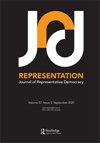混合选民:国内和新国家的政治如何影响外部选民
Q2 Social Sciences
引用次数: 3
摘要
摘要本文基于20年来收集的6个欧洲国家的选举数据,分析了非居民公民在原籍国选举中的投票情况。我们的调解模型表明,一个政党的外部选票份额取决于选举前该党在母国的支持率,以及同时在新居住国登记的意识形态相近政党的支持率。因此,我们的结果表明,外部投票选择是混合的:它们大多反映了他们“原籍”国的政治背景,但也反映了“新”居住国的政治。此外,文章表明,在职与一个政党在外部社会中所占份额之间的联系不是直接的,而是由该政党在母国的支持程度和意识形态相似的政党在东道国的支持程度介导的。这一发现进一步证实,国内和新国家的民意流动都决定了外部选民的选择。本文章由计算机程序翻译,如有差异,请以英文原文为准。
Hybrid Voters: How the Politics in the Home and the New Country Influences External Voters
ABSTRACT Based on 20 years of election data gathered for 6 European countries, this article analyses how the non-resident citizens vote from abroad in the elections of their origin country. Our mediation model demonstrates that the external vote share of a party is dependent on the support for this party in the home-country before the election and the support registered for ideologically close parties in the new country of residence at the same moment. Our results put thus forward that external voting choices are hybrid: they mostly reflect the political context of their ‘home’ origin country, but also mirror politics in the ‘new’ country of residence. Furthermore, the article shows that the link between incumbency and the share taken by a party among the external community is not direct but mediated by how much is this party supported in the home-country, and how much ideologically similar parties are supported in the host-country. This finding further confirms that the flow of public opinion in the home and the new country both shape the choices that are made by external voters.
求助全文
通过发布文献求助,成功后即可免费获取论文全文。
去求助
来源期刊

Representation
Social Sciences-Sociology and Political Science
CiteScore
3.50
自引率
0.00%
发文量
31
期刊介绍:
This change in scope follows two paths. Firstly, it seeks contributors who are interested in exploring the interface between democratic practice and theory. In particular, this focus seeks contributions that apply theoretical insights to actual examples of current practice. Secondly, while not neglecting the current focus of the journal, we would like to expand its international coverage so that the journal will offer our readers insights in the state of democracy worldwide.
 求助内容:
求助内容: 应助结果提醒方式:
应助结果提醒方式:


